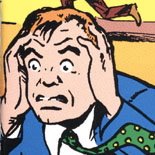Last Words (and Pictures)
Hey, I'm back. Miss me?
I want to talk about last pages. It's really the advantage of the singles over the trade. The shocking reveal. The nail-biting cliffhanger. The joke and freeze. Even the summation, moral, and coda. The great last page confirms "Yeah, you just read A Story, a real story, and don't it suck for you that you have to wait a whole 'nother month for what else we got in store." You lose that in the trade. Golden moments, like Superman and Lex Luthor plummeting to Earth in Up, Up, and Away, are frozen in time as you wait weeks for the next issue. In the trade, it's just another page in the middle of the book.
Yeah, it's arbitrary, a product of the medium rather than a creative choice, but good creators can make the boundaries work for them. I bought six comics last week* and all but one had BRILLIANT last pages. (The outlier was Boys #4, which is probably my new definition of "wait for the trade.")
Secret Six #5 employed the classic, reveal and cliffhanger one-two: forgotten character reappears, then immediately puts our heroes in mortal jeopardy. Now you have to read issue #6, the conclusion, to see how our "heroes" get out of this one. If they get out of this one.
52 #25 does the classic with a double twist. Not only does the mysterious mastermind behind the Island of Mad Scientists step forward to imperil Black Adam and Isis, his identity turns out to be a new twist on an old, buried character, and his particular threat references earlier clues in the series itself, drawing the disparate plots together.
Action Comics #844 has a reveal, but really the last page serves as a summation and conclusion. It ends the chapter being told. The story could conceivably just end on that last page, since it establishes a new but relatively stable status quo. Not that it will, because there's a "to be continued" hiding in the bottom right corner and the new status quo is too big a change to be confined to just one book.
Nextwave #9, plotwise, doesn't have that great a last page. Nothing's revealed. The heroes are in no more or less danger on the last page then they were six pages earlier. It certainly isn't the end of the story, or even the beginning of a new one. But it was a PERFECT last page. Because it contained a joke--a joke so powerful that I could not continue reading. That's right, Ellis and Immonen knew that anything read after that page would be lost in its massive wake, so they moved it to the end where it could do no harm to the rest of the story, while at the same time positioning the joke for maximum focus, making it more powerful than you can possibly imagine! But of course, the comic of the week, my HANDS DOWN pick, is Seven Soldiers of Victory #1. And it had THREE great last pages. Sure it could have ended on page 37. With its narration directed at the reader and image and panels that recall the first page of the first issue of Seven Soldiers, it would have been a nice bookend. Or it could have ended with page 38, the twist ending. But like Nextwave before it, Seven Soldiers had a moment, an image so powerful that it FORCED itself to the last page. The moment certainly isn't the end of the story. It's not even a very important moment to the main plot.
But of course, the comic of the week, my HANDS DOWN pick, is Seven Soldiers of Victory #1. And it had THREE great last pages. Sure it could have ended on page 37. With its narration directed at the reader and image and panels that recall the first page of the first issue of Seven Soldiers, it would have been a nice bookend. Or it could have ended with page 38, the twist ending. But like Nextwave before it, Seven Soldiers had a moment, an image so powerful that it FORCED itself to the last page. The moment certainly isn't the end of the story. It's not even a very important moment to the main plot.
But the image IS the story of Seven Soldiers. It's a monument to unending nature of comics, that every last page is an advertisement for the next issue, that every death and birth is there for later writers to undo and redo. It's an image that mixes the macabre with the sacred, the simple with the mysterious, the absolute mundane with the beyond fantastic. It's an image that says superheroes can do impossible things, and that's why we love them. It's a moment so great that there just can't be another page, even though it's a last page that SCREAMS "TO BE CONTINUED!!!" without saying a word. It has to be the last page, because after seeing that page, there's nothing left to say...
until next month...
*yeah, vacation doesn't stop the habit. Once, when traveling through Alaska, I made a stop at the world's most Northern Comic Book store to pick up Zero Hour #0, which was out that week.


